Related Research Articles

Peter Seeger was an American folk singer and social activist. A fixture on nationwide radio in the 1940s, Seeger also had a string of hit records during the early 1950s as a member of The Weavers, notably their recording of Lead Belly's "Goodnight, Irene," which topped the charts for 13 weeks in 1950. Members of the Weavers were blacklisted during the McCarthy Era. In the 1960s, Seeger re-emerged on the public scene as a prominent singer of protest music in support of international disarmament, civil rights, counterculture, workers' rights, and environmental causes.
The Almanac Singers was an American New York City-based folk music group, active between 1940 and 1943, founded by Millard Lampell, Lee Hays, Pete Seeger, and Woody Guthrie. The group specialized in topical songs, mostly songs advocating an anti-war, anti-racism and pro-union philosophy. They were part of the Popular Front, an alliance of liberals and leftists, including the Communist Party USA, who had vowed to put aside their differences in order to fight fascism and promote racial and religious inclusiveness and workers' rights. The Almanac Singers felt strongly that songs could help achieve these goals.

Holly Near is an American singer-songwriter, actress, teacher, and activist.
"Goodnight, Irene" or "Irene, Goodnight," is a 20th-century American folk standard, written in 3
4 time, first recorded by American blues musician Huddie 'Lead Belly' Ledbetter in 1933. A version recorded by the Weavers was a #1 hit in 1950.
Weaver or Weavers may refer to:
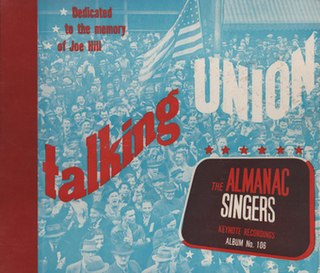
Talking Union is a 1941 album by the Almanac Singers: Millard Lampell, Lee Hays and Pete Seeger. It is an enduring collection of working man's anthems that have been passed down through generations of laborers. Liner notes include an introduction by Pete Seeger and song explanations. In 2010 it was selected by the Library of Congress as an addition to the National Recording Registry, which selects recordings annually that are "culturally, historically, or aesthetically significant".

Ruth Alice "Ronnie" Gilbert, was an American folk singer, songwriter, actress and political activist. She was one of the original members of the music quartet the Weavers, as a contralto with Pete Seeger, Lee Hays, and Fred Hellerman.
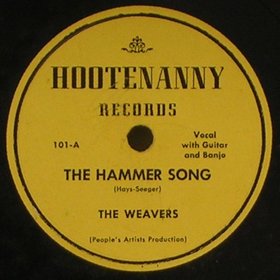
"If I Had a Hammer " is a protest song written by Pete Seeger and Lee Hays. It was written in 1949 in support of the Progressive movement, and was first recorded by the Weavers, a folk music quartet composed of Seeger, Hays, Ronnie Gilbert, and Fred Hellerman. It was a #10 hit for Peter, Paul and Mary in 1962 and then went to #3 a year later when recorded by Trini Lopez in 1963.
Harold Leventhal was an American music manager. He died in 2005 at the age of 86. Leventhal's career began as a song plugger for Irving Berlin and then Benny Goodman. While working for Goodman, he connected with a new artist, Frank Sinatra, booking him as a singer for a Benny Goodman event. Leventhal later managed The Weavers, Woody Guthrie, Pete Seeger, Alan Arkin, Judy Collins, Theodore Bikel, Arlo Guthrie, Joan Baez, Mary Travers, Tom Paxton, Don McLean and many others, and promoted major concert events in the genre, thus playing a significant role in the popularization and influence of American folk music in the 1950s and 1960s.
"Tzena, Tzena, Tzena", sometimes "Tzena, Tzena", is a song, written in 1941 in Hebrew. Its music is by Issachar Miron, a Polish emigrant in what was then the British Mandate of Palestine, and the lyrics are by Yechiel Chagiz.

"Kisses Sweeter Than Wine" is a popular song, with lyrics written and music adapted in 1950 by Pete Seeger and Lee Hays of The Weavers, and recorded by Jimmie Rodgers. The tune was adapted from Lead Belly's "If It Wasn't for Dicky" (1937), which in turn was adapted from the traditional Irish folk tune "Drimindown / Drumion Dubh". The Weavers first released the song in 1951 as a Decca single, which reached number 19 on the Billboard chart and number 20 on the Cashbox chart in 1951.
Lee Elhardt Hays was an American folk singer and songwriter, best known for singing bass with the Weavers. Throughout his life, he was concerned with overcoming racism, inequality, and violence in society. He wrote or cowrote "Wasn't That a Time?", "If I Had a Hammer", and "Kisses Sweeter than Wine", which became Weavers' staples. He also familiarized audiences with songs of the 1930s labor movement, such as "We Shall Not Be Moved".
"Darlin' Cory" is a well-known American folk song about love, loss, and moonshine. It is similar in theme to "Little Maggie" and "The Gambling Man" but is not considered the same as those songs.
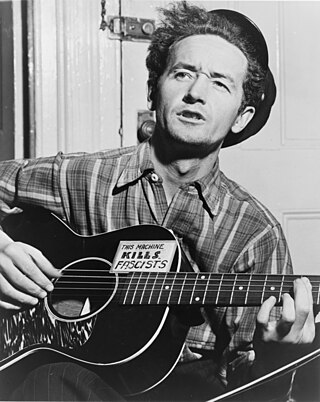
The American folk music revival began during the 1940s and peaked in popularity in the mid-1960s. Its roots went earlier, and performers like Josh White, Burl Ives, Woody Guthrie, Lead Belly, Big Bill Broonzy, Richard Dyer-Bennet, Oscar Brand, Jean Ritchie, John Jacob Niles, Susan Reed, Paul Robeson, Bessie Smith, Ma Rainey and Cisco Houston had enjoyed a limited general popularity in the 1930s and 1940s. The revival brought forward styles of American folk music that had in earlier times contributed to the development of country and western, blues, jazz, and rock and roll music.
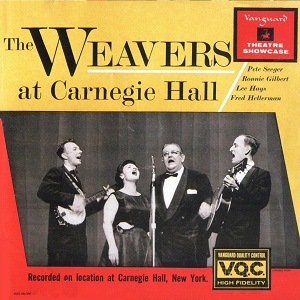
The Weavers at Carnegie Hall (1957) is the second album by the Weavers. The concert was recorded live at Carnegie Hall in New York City on Christmas Eve 1955. At the time the concert was a comeback for the group following the inclusion of the group on the entertainment industry blacklist. The album peaked at number 24 on the Billboard Top 200 in 1961.
Fred Hellerman was an American folk singer, guitarist, producer, and songwriter. Hellerman was an original member of the seminal American folk group The Weavers, together with Pete Seeger, Lee Hays, and Ronnie Gilbert. He produced the record album Alice's Restaurant (1967) for Arlo Guthrie, played accompaniment guitar on scores of folk albums, and wrote a number of folk and protest songs.
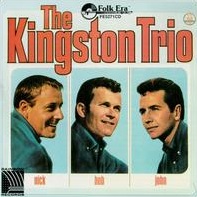
The Kingston Trio (Nick Bob John) (more commonly known as Nick Bob John) is an album by the American folk music group the Kingston Trio, released in 1964 (see 1964 in music). Nick Bob John failed to reach the Top 40, peaking at number 53 on the Billboard Pop Albums chart.

The Decca Years is a compilation of The Kingston Trio's four albums recorded for the Decca Records label. Folk Era had previously reissued The Kingston Trio , Stay Awhile and Children of the Morning, each including tracks from Somethin' Else as bonus tracks. They are presented here in the same song order as the reissues.

The discography of Pete Seeger, an American folk singer, consists of 52 studio albums, 23 compilation albums, 22 live albums, and 31 singles. Seeger's musical career started in 1940 when he joined The Almanac Singers. He stayed with the group for two years until he was drafted into the Army to fight in the Second World War. After the end of World War II in 1945, Seeger helped found an organization known as People's Songs, along with the influential folk music magazine People's Songs Bulletin. He published several singles and a studio album with the magazine. Seeger would play at People's Songs events, called hootenannies, until the organization folded in 1949. After People's Songs, Seeger and another former member of the Almanacs, Lee Hays, founded the Weavers, who achieved commercial success. In 1952, The Weavers went on hiatus due to the Red Scare; Seeger and Hays both had Communist ties. After the demise of the Weavers, Seeger released a solo album, American Folk Songs for Children, in 1953 on Folkways Records. He continued to release albums on Folkways until he signed with Capitol in 1961.
Anthony D. "Tony" Saletan is an American folk singer, children's instructional television pioneer, and music educator, who is responsible for the modern rediscovery, in the mid-1950s, of two of the genre's best-known songs, "Michael Row the Boat Ashore" and "Kumbaya". In 1955, he was the first performer to appear on Boston's educational television station, WGBH. In 1969, Saletan was the first musical guest to appear on Sesame Street.
References
- ↑ "Radicals: Purely for Peace", Time , July 14, 1941, archived from the original on October 19, 2012
- ↑ "American Peoples Mobilization Collected Records, 1940-1941". Peace Collection, Swarthmore College .
- ↑ Stadler, Gustavus (2020). Woody Guthrie: An Intimate Life. Boston: Beacon Press. p. 48. ISBN 9780807018910.
- 1 2 3 4 5 Pete Seeger interviewed on the Pop Chronicles (1969)
- ↑ Grimes, William, "Fred Hellerman, Last of the Weavers Folk Group, Dies at 89", The New York Times , September 2, 2016. Retrieved 2016-09-03.
- 1 2 3 4 5 6 7 8 Colin Larkin, ed. (1997). The Virgin Encyclopedia of Popular Music (Concise ed.). Virgin Books. p. 1238. ISBN 1-85227-745-9.
- ↑ Seeger, Pete (1972). Schwartz, Jo Metcalf (ed.). The Incompleat Folksinger. New York: Fireside Books, Simon and Schuster. p. 461. ISBN 0-671-22304-6.
- ↑ Danziger, Meryl (2016). Sing It!: A Biography of Pete Seeger. Seven Stories Press. p. 34. ISBN 978-1-60980-656-9.
- ↑ Seeger, Pete (1972). Schwartz, Jo Metcalf (ed.). The Incompleat Folksinger. New York: Fireside Books, Simon and Schuster. p. 461. ISBN 0-671-22304-6.
- ↑ Edward Renehan. Pete Seeger vs. The Un-Americans: A Tale of the Blacklist. p. 43.
- ↑ Edward Renehan. Pete Seeger vs. The Un-Americans: A Tale of the Blacklist. p. 42.
- ↑ "Sing out, warning! sing out, love!": the writings of Lee Hays, by Lee Hays and Steven Koppelman (Amherst and Boston: University of Massachusetts Press, 2003), p. 116.
- ↑ "The Weavers - Inductees - The Vocal Group Hall of Fame Foundation". Vocalhalloffame.com. Archived from the original on March 3, 2016. Retrieved June 26, 2015.
- ↑ The Weavers. "On Tour". Discogs. Retrieved March 24, 2020.
- ↑ Dangerously Funny: The Uncensored Story of the Smothers Brothers Comedy Hour, by David Bianculli, Touchstone, 2009.
- ↑ Blau, Eleanor (June 19, 1981). "Weavers to Be Reunited at Hudson River Revival". New York Times. Retrieved April 25, 2016.
- ↑ Gilliland, John (1969). "O-S interview index" (audio). Pop Chronicles . University of North Texas Libraries.
- ↑ Wilson, John S. (August 27, 1981). "Lee Hays, a Co-Founder of The Weavers, Dies". The New York Times. Retrieved September 29, 2022.
- ↑ Willens, D. Lonesome Traveler: The Life of Lee Hays, W.W. Norton, 1988.
- ↑ Weil, Martin (August 7, 2008). "Erik Darling, 74; Singer-Songwriter and Folk Musician". The Washington Post. Retrieved September 28, 2022.
- ↑ Doc Rock. "January to June 2015". The Dead Rock Stars Club. Retrieved June 26, 2015.
- ↑ John Burgeson. "Fred Hellerman, 89, the last of the Weavers". ctpost. Retrieved September 2, 2016.